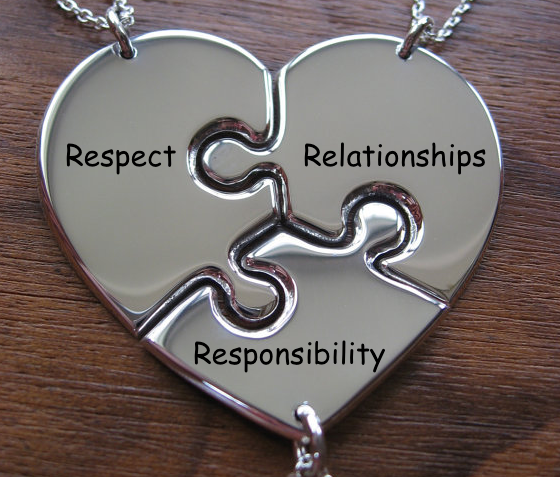My teaching philosophy is based upon the 3 Rs: Respect, Relationships and Responsibility. They are at the heart of my educational journey puzzle. I try to weave these three components into my lessons and work to help students to discover the value of their presence in their own lives.
A classroom community is a very tight knit group, spending multiple hours a day, typically five days a week. That is a lot of time to be with the same group of people who have a broad range of wants and needs. Therefore, I believe that overall, respect should govern the classroom environment for it to function effectively. There should be respect between teacher and student and between students. Each person should treat others the way they want to be treated.
It is hard to completely avoid the consistently arising issues at schools between students, both in and outside the classroom. However, I have a goal of helping students become competent and able to solve those issues on their own. The BC Performance Standards for Social Responsibility include a set of expectations for student development that I incorporate into my instruction. Number two, Solving Problems in Peaceful Ways, is one I love to address, learning to manage conflict appropriate and using effective problem-solving steps and strategies.
For me, relationships are not only important but also valued. This includes relationships between teacher and student, students and students, and students and the material taught in class. By emphasizing this in the classroom, it will help create an inclusive and accepting classroom community. In addition, through my inquiry, I have learned that students have a more influential learning experience when they can connect their learnings to something they already know; in essence, develop a relationship. Therefore, I want to work towards finding these connections and helping them find them on their own.
I want to get to know students as individuals- the soon to be adults of our social communities. Being able to identify their likes and dislikes will help further the effectiveness of my instruction, working to engage them more in the material. Students should also know what makes each child unique starting from the first day. This way, friendships can be fostered and an understanding and respect for differences can be created and maintained throughout the year.
Finally, I want to foster a classroom climate or environment that develops a student’s sense of responsibility. When students take control of their own learning, they are more motivated and engaged. I hope for students to come in to school each day, wanting to expand their knowledge, putting in effort and diligence into their work. In addition, students should be held responsible for their classroom community and work to share responsibility for the social and physical environments around them. For example, if there is a mess of paper and pencils on the floor, it is their responsibility to clean it and maintain their work space in a condition that helps them and others around them to learn and be safe.
I had a professor recently say something that reflects how I like to view education: “You are teaching humans, not the subject.” This is what I structure my instruction around.

